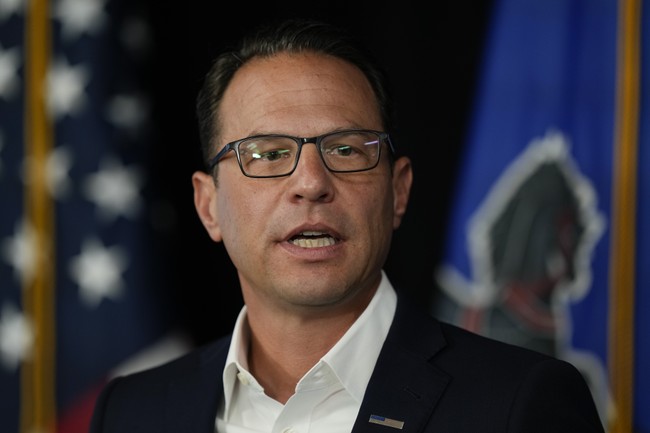Pennsylvania Farm Leaders Applaud Aggressive Action Against Avian Flu
This post was originally published on this site

HARRISBURG, Pennsylvania — Gov. Josh Shapiro (D-Pa.) took the threat of avian flu head-on at a town hall at the 109th annual Pennsylvania Farm Show, saying that as highly pathogenic avian influenza spreads to dairy in other states, his administration would remain proactive and aggressive in establishing a nation-leading surveillance-testing system for milk at the processor level.
Advertisement
“Because of our aggressive approach to testing and quarantine plans, we successfully reduced the threat of avian flu and haven’t had a positive test after taking over 10,000 milk samples,” he said.
Dan Hougentogler, the top animal disease expert who specializes in poultry diseases, emergency response, biosecurity education and implementation, said Pennsylvania is one of the four top egg-producing states in the country, along with Ohio, Indiana and Iowa. He said Shapiro has been proactive in protective actions that have helped keep livestock and farmers safe.
Walk all along the cavernous Farm Show Complex in Harrisburg, and you will be surrounded by interactive exhibits, with farmers young and not so young displaying and educating visitors from across the commonwealth and neighboring states about the importance of the biggest economic driver in the state: agriculture.
However, live bird exhibits are limited to the birds headed to market, and Farm Show visitors are restricted from handling or petting the birds. The governor’s office said farmers exhibiting live animals at the Farm Show must present a certificate of veterinary inspection signed by an accredited veterinarian within 30 days prior to their arrival.
Chris Herr, executive vice president of PennAG, an agriculture trade organization, said these preventive measures are necessary to curtail the spread of the disease.
Advertisement
“Pennsylvania has been on high alert since the first outbreak of HPAI three years ago; that has included quarantines that makes sure it doesn’t spread to other livestock,” he said.
Hougentogler explained that avian flu, or bird flu, is a highly contagious disease with a high mortality rate among the poultry population: “When hit, it causes a high decrease in production, which then causes often devastating economic losses for the farmer and adds to the impact inflation has had with diesel fuel, which causes egg prices to skyrocket.”
Agriculture is a major economic driver in Pennsylvania. According to data from the governor’s office, the agriculture sector contributes $132 billion annually to Pennsylvania’s economy and supports more than 580,000 jobs statewide. And those are just the direct jobs. Talk to anyone at the Farm Show, and they’ll say agribusiness casts a wide net with spillover economic effects as well.
There are farm products at the local feed stores and suppliers, as well as trucking services, mechanics, veterinary services, manufacturing and the natural gas industry. The list goes on and on. These workers then use their wages to invest in local economies.
Shapiro, when asked by reporters after his speech about what the plan is going forward for 2025 in the state with regard to the bird flu, said, “Look, a huge part of being able to protect our flocks from high-path avian influenza is having really good communication with our farmers — from our big farmers, you know, big scale, down to our Amish farms.”
Advertisement
Shapiro stressed that he and Pennsylvania Agriculture Secretary Russell Redding have been on the road visiting farmers across the spectrum in the state.
“We’ve been down in the basements of Amish living quarters, talking directly to them, letting them know that we’re here to help and that the biosecurity measures we want them to participate in is for their own good and the collective good,” he said. “The good news is, we are seeing folks all in on adopting those biosecurity measures and protecting their flocks and other people’s flocks.”
Shapiro warned that he could not say that the state would be bird flu-free forever.
“God willing, we will be,” he said, “but I can tell you that we’re much further along in the calendar and much further along than other states, I think because of the great communication we’ve had with our farmers and their willingness to adopt these biosecurity measures and work closely with us.”
Hougentogler explained that the highly contagious bird flu, deadly to poultry, is spread from wild waterfowl, such as migrating snow geese and ducks, through their feces and saliva.
“It has the power to significantly impact the commercial poultry industry,” he warned.
Last week, the Pennsylvania Game Commission said preliminary testing showed bird flu is suspected to have caused the death of 200 migrating snow geese in the Lehigh Valley, warning that wild waterfowl and shorebirds are considered natural reservoirs for avian influenza viruses.
Advertisement
“While infected birds may shed the virus in their feces and saliva despite appearing healthy, HPAI can lead to sickness or death in raptors (hawks, eagles), avian scavengers (crows, gulls, ravens), other waterfowl species (ducks, geese), and wild poultry (turkey, grouse),” commission officials continued in a news release.
Herr explained that Pennsylvania has been a leader in testing dairy cattle and ensuring that lactating dairy cattle from stricken farms in other states don’t infect Pennsylvania cattle.
“It is all about testing and more testing in the state,” he said.
Hougentogler and Herr share Shapiro’s concern about the threat of the bird flu spreading in the state. Hougentogler said that nationwide, in the last 30 days, there have been 13 million egg layers who have been depopulated.
“What you have in Pennsylvania has been a very aggressive, proactive approach that (is) allocating resources in education as well as financial resources, and that is critically important,” he said.
Salena Zito is a CNN political analyst, and a staff reporter and columnist for the Washington Examiner. She reaches the Everyman and Everywoman through shoe-leather journalism, traveling from Main Street to the beltway and all places in between. To find out more about Salena and read her past columns, please visit the Creators Syndicate webpage at www.creators.com.
Advertisement
